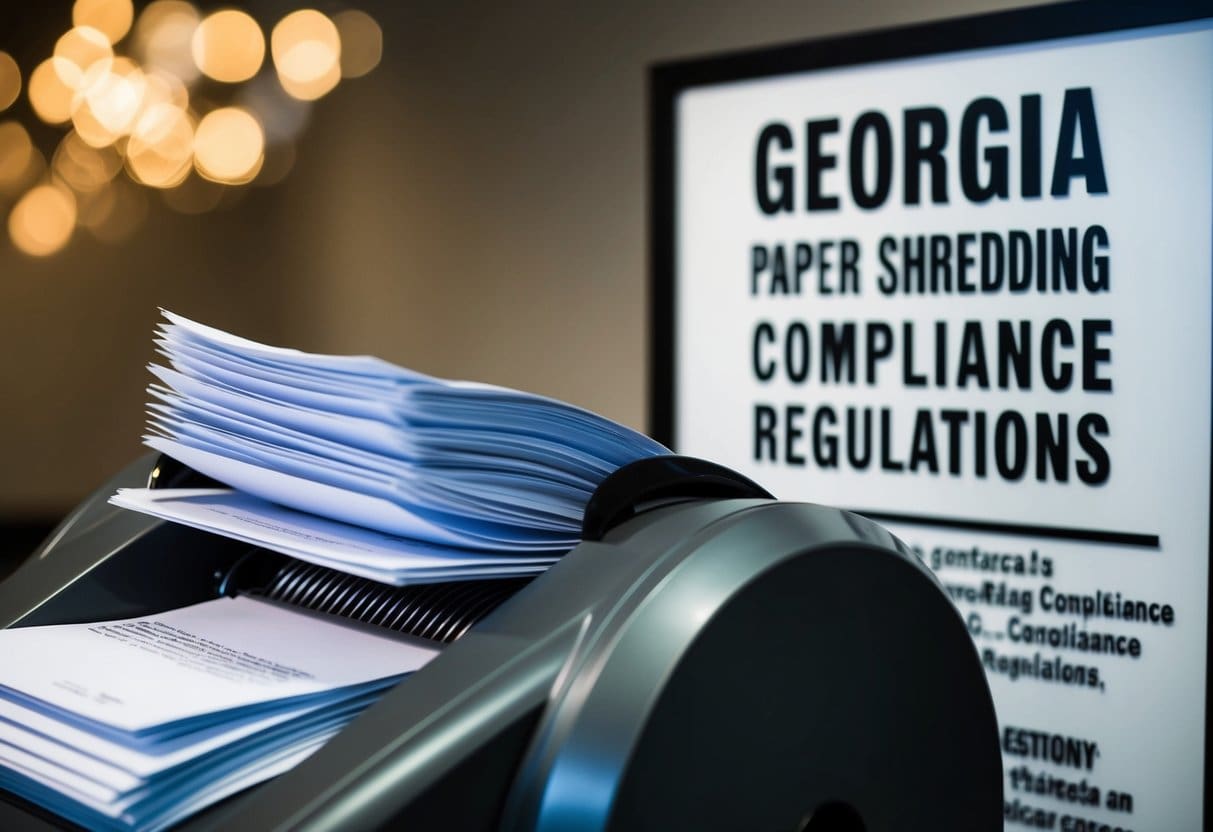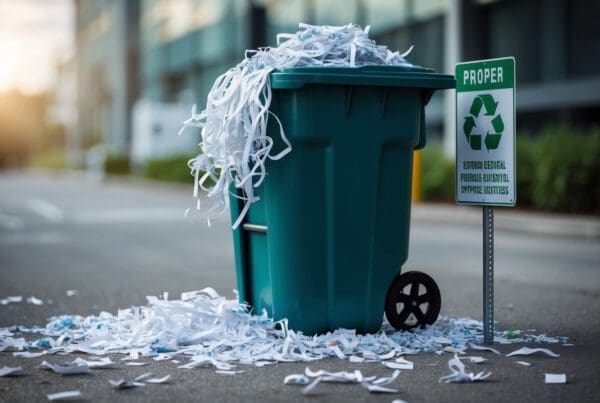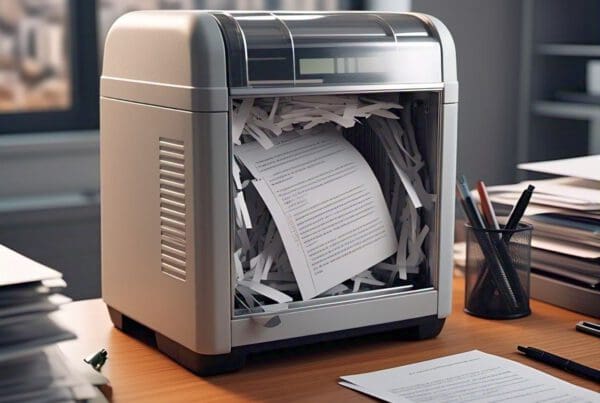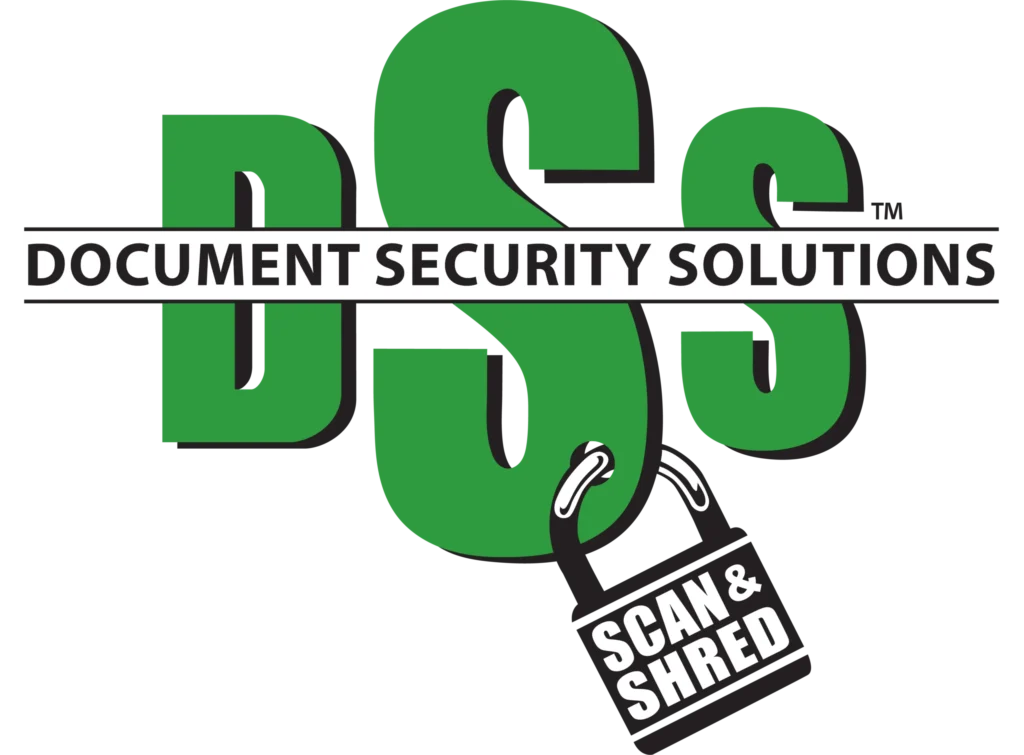Overview of Paper Shredding Regulations in Georgia
In Georgia, paper shredding must adhere to specific regulations to ensure data security and privacy. Understanding these regulations and certifications like NAID AAA helps us ensure compliance and protect sensitive information.
State-Specific Legal Requirements
Georgia’s regulations on paper shredding focus on maintaining privacy and data security standards. State laws require businesses to safeguard personal information and dispose of it securely. We must follow these regulations to avoid penalties and ensure customers’ trust.
Confidential information must be destroyed so that it cannot be reconstructed. Specific laws detail how personal data should be shredded, making secure methods essential. Each location across Georgia should implement consistent practices to comply with these legal requirements.
Significance of NAID AAA Certification
NAID AAA Certification sets the standard for secure information destruction. This credential means that a shredding company follows strict protocols to protect sensitive data. For us, obtaining or using a provider with this certification assures our clients of reliable data security practices.
Achieving this certification involves rigorous audits and adherence to operational standards. It ensures that shredding processes meet both federal and state compliance requirements. Certification provides confidence in our commitment to safeguarding privacy and maintaining regulatory compliance.
Implementing Compliant Shredding Practices
In Georgia, following proper shredding practices is crucial to maintain compliance with regulations. We’ll focus on creating a comprehensive policy, understand how long to keep documents, and highlight the significance of a certificate of destruction.
Establishing a Shredding Policy
Creating a shredding policy helps protect sensitive information. We must first assess the types of documents we handle and determine which contain confidential data. Sensitive information might include financial records, customer data, or employee files.
Once identified, it’s essential to decide who is responsible for the shredding process. Assign roles and responsibilities to ensure accountability. Consider using professional shredding services. They often provide secure containers and regular pickup schedules, making it easier to maintain compliance.
Regular training sessions should be organized. Everyone involved must understand the importance of following the policy. This minimizes risks and helps avoid legal issues. By having a clear policy, we can ensure efficient document shredding and enhance data privacy.
Understanding Document Retention Periods
Knowing how long to keep documents is another key part of compliance. Regulations vary, but they typically specify retention periods for different types of files. Financial records, for example, might need to be kept longer than other documents.
It’s important to maintain a document retention schedule. This outlines when documents should be securely destroyed. A good schedule prevents unnecessary storage and reduces breach risks.
We should revisit and update our schedule regularly. As laws change, document retention requirements might also change. Staying informed helps us to remain compliant. If in doubt, consulting legal experts or compliance professionals ensures we meet all necessary regulations.
Certificate of Destruction and Its Importance
Finally, obtaining a certificate of destruction is crucial when shredding documents. This certificate serves as legal proof that sensitive information was properly disposed of. It typically includes details like shredding date, method used, and verification by the shredding company.
This document is important for audits or investigations. Having it shows that we take data protection seriously. It also reassures our clients and partners about how we handle their information securely.
When using shredding services, they should automatically provide us with a certificate. Always keep these certificates on file for reference. This practice increases trust and accountability and ensures that our shredding methods meet compliance standards.
Protecting Sensitive Information
To protect sensitive information, we must understand the risks of data breaches and follow secure shredding guidelines. This helps ensure compliance with regulations and protects against identity theft.
Risk of Data Breaches and Identity Theft
Data breaches are a serious threat. If personal details are exposed, it can lead to identity theft. We should store and process sensitive information carefully to avoid these risks. HIPAA, GLBA, and FACTA are important regulations to keep in mind for data protection.
Key risks:
- Unauthorized access to personal data
- Financial and reputational damage
- Legal consequences for non-compliance
Security measures can help minimize risks. By being aware of data vulnerabilities, we actively contribute to securing personal information. Information security is critical in preventing breaches and protecting our privacy.
Secure Shredding and Data Protection Guidelines
Secure shredding is a crucial step in handling outdated personal information. By shredding documents properly, we ensure that information can’t be reconstructed.
Steps for secure shredding:
- Separate sensitive documents from regular waste.
- Use cross-cut shredders for increased security.
- Audit shredding processes regularly.
We must adhere to guidelines to protect data effectively. Following proper shredding protocols helps us stay compliant with privacy laws like HIPAA and FACTA. This proactive approach prevents unauthorized access and shields against identity theft. Shredding responsibly is a powerful defense in our data protection strategy.
Industry-Specific Shredding Requirements
In Georgia, different industries have specific rules for shredding documents. These rules are necessary to protect confidential information and maintain trust with clients. Two key areas are healthcare and finance.
Healthcare Providers and HIPAA Compliance
Healthcare providers in Georgia must follow the Health Insurance Portability and Accountability Act (HIPAA). HIPAA requires us to handle personal health information safely. When we need to dispose of such documents, shredding is essential. Shredding ensures that health records cannot be reconstructed or read. If we don’t comply, we could face steep fines and penalties.
Healthcare providers should set up strict shredding procedures. These procedures involve training staff and using secure shredding services. By doing this, we help maintain confidentiality and demonstrate our commitment to patient privacy. In summary, shredding is a crucial aspect of HIPAA compliance.
Financial Institutions and Gramm-Leach-Bliley Act
For financial institutions, compliance with the Gramm-Leach-Bliley Act (GLBA) is crucial. This law requires us to protect consumers’ financial information. Shredding documents with sensitive data is a key part of these requirements. Proper document destruction builds client trust and prevents identity theft.
In Georgia, financial institutions should have a shredding policy in place. This policy should detail how and when documents are destroyed. We need to ensure our shredding methods meet legal standards to avoid penalties. Regular audits help in maintaining compliance and safeguarding client information. The GLBA makes document security a priority, and shredding is vital in fulfilling this responsibility.
Shredding Service Options in Georgia
We offer several shredding service options to ensure secure disposal of documents in Georgia. These include on-site, off-site, mobile, and drop-off shredding. Each option has unique benefits for businesses and individuals seeking safe, compliant shredding solutions.
On-Site vs. Off-Site Shredding
On-site shredding involves a shredding truck coming directly to your location. This ensures instant secure disposal and the ability to witness the shredding process. It provides peace of mind, especially when handling sensitive customer information.
Off-site shredding, on the other hand, involves collecting documents and transporting them to a secure facility for shredding. This option might be more cost-effective for larger volumes. Both methods should meet NAID certification standards to guarantee safe and compliant practices.
Mobile Shredding and its Advantages
Mobile shredding services bring the shredding process to us. A specialized truck equipped with shredding machinery arrives at our location and shreds documents while we’re there. This method saves time and increases convenience since we can observe the process personally.
Mobile shredding is particularly suitable for companies that need regular on-site shredding or those handling confidential records. It’s efficient and ensures compliance with data protection regulations. We should ensure that mobile providers comply with NAID standards for extra security assurance.
Drop-Off Shredding for Small Businesses
Drop-off shredding services are ideal for small businesses or individuals with fewer documents. We can take our papers to a specific location where they are securely shredded. This option provides flexibility as we can shred according to our schedule.
The cost is usually lower compared to on-site services, making it a budget-friendly choice. Many centers also ensure secure disposal through adherence to recognized standards. When choosing a drop-off location, we should verify their certification and security measures to maintain compliance.
By understanding these options, we can choose the best fit for our document security needs.





